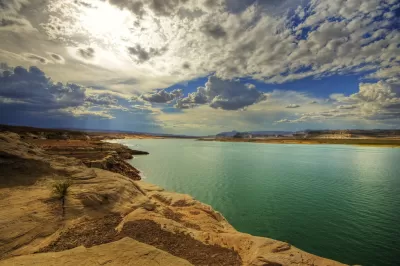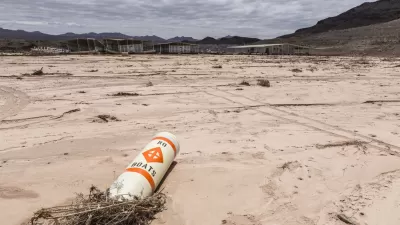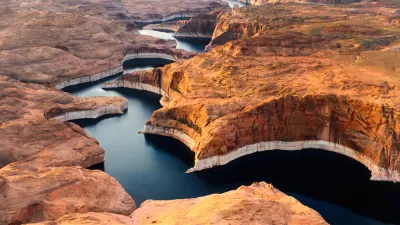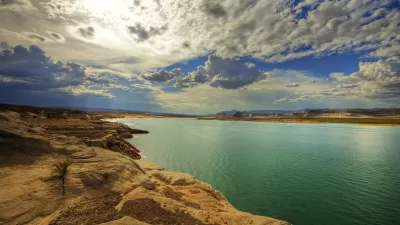As climate changes in the Rockies and the southwest, Lake Powell is gradually shrinking. The debate over Glen Canyon Dam is on again, and this time environmentalists aren't the only ones against it.

The Colorado River has played host to infrastructural drama for almost a century. Now, amidst drought, its formerly vast water supply is shrinking. A debate has reignited "about whether 20th-century solutions can address the challenges of an epochal 21st-century drought, with a growing chorus of prominent former officials saying the plans fly in the face of a new climate reality."
One of the main criticisms is that Lake Powell (and Lake Mead) waste immense quantities of water. Abrahm Lustgarden describes that in what is "perhaps the most egregious failure for a system intended to conserve water, many [reservoirs] lose hundreds of billions of gallons of precious water each year to evaporation and, sometimes, to leakage underground." Phasing out Glen Canyon Dam would save about 179 billion gallons of water a year, enough to supply Los Angeles.
Moreover, Glen Canyon Dam's venerable hydroelectric capacity is declining as climate change plays havoc with its reservoir's water level. "Since the dam's power sales are relied on to pay for the operations of other smaller dams and reservoirs used for irrigation in the West, as Glen Canyon financially crumbles, so might the system that depends on it."
Lustgarden notes that in 2015 alone, six smaller dams were deconstructed in the western states, with four more on the Klamath River on their way out. But the politics around Glen Canyon and the Colorado River are on another level entirely, and so far there hasn't been any real movement on the issue.
FULL STORY: Drought Be Damned: Has the 20th-Century Promise of America’s Dams Run Its Course?

Maui's Vacation Rental Debate Turns Ugly
Verbal attacks, misinformation campaigns and fistfights plague a high-stakes debate to convert thousands of vacation rentals into long-term housing.

Planetizen Federal Action Tracker
A weekly monitor of how Trump’s orders and actions are impacting planners and planning in America.

Chicago’s Ghost Rails
Just beneath the surface of the modern city lie the remnants of its expansive early 20th-century streetcar system.

Bend, Oregon Zoning Reforms Prioritize Small-Scale Housing
The city altered its zoning code to allow multi-family housing and eliminated parking mandates citywide.

Amtrak Cutting Jobs, Funding to High-Speed Rail
The agency plans to cut 10 percent of its workforce and has confirmed it will not fund new high-speed rail projects.

LA Denies Basic Services to Unhoused Residents
The city has repeatedly failed to respond to requests for trash pickup at encampment sites, and eliminated a program that provided mobile showers and toilets.
Urban Design for Planners 1: Software Tools
This six-course series explores essential urban design concepts using open source software and equips planners with the tools they need to participate fully in the urban design process.
Planning for Universal Design
Learn the tools for implementing Universal Design in planning regulations.
planning NEXT
Appalachian Highlands Housing Partners
Mpact (founded as Rail~Volution)
City of Camden Redevelopment Agency
City of Astoria
City of Portland
City of Laramie





























